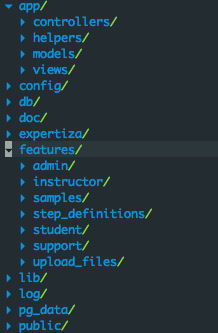Using Cucumber with Expertiza: Difference between revisions
Jump to navigation
Jump to search
| Line 20: | Line 20: | ||
===Features=== | ===Features=== | ||
In Expertiza, features are stored in /features. Within this folder you can find several sub-folders such as /admin, /instructor, and /student. This structure is to organize tests that apply to specific roles. | In Expertiza, features are stored in /features. Within this folder you can find several sub-folders such as /admin, /instructor, and /student. This structure is to organize tests that apply to specific roles. | ||
[[File:Cuke-features.png]] | |||
[center][[File:Cuke-features.png]][/center] | |||
===Scenarios=== | ===Scenarios=== | ||
Revision as of 19:01, 8 February 2013
Cucumber Stack
Gherkin
Gherkin is the language used to write Cucumber executable feature specifications in conversational syntax. The syntax provides structure and meaning using special keywords including:
- Feature
- Background
- Scenario
- Given
- When
- Then
- And
- But
- Scenario Outline
- Examples
Capybara
Behavior Driven Development
The BDD paradigm is that it's better to write code you wish you had and have a feature that is working instead of writing something you’re not sure is right and writing tests around it.
Features
In Expertiza, features are stored in /features. Within this folder you can find several sub-folders such as /admin, /instructor, and /student. This structure is to organize tests that apply to specific roles.
